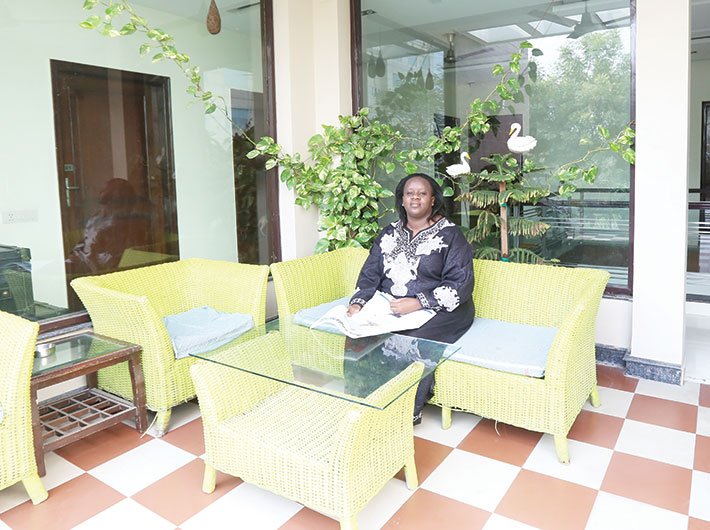Gurugram’s guesthouses are the mainstay of medical tourism in the city and pay all the taxes. But they don’t have licences because the govt has not framed a policy
When Jane Katuse, a Nigerian national, arrived in Gurugram to undergo in-vitro fertilisation (IVF) at the Artemis Hospital, she settled into an airy, well-appointed guesthouse. It is in fact a large house, refurbished as 14 comfortable rooms with mod cons. Unlike hotels, which are usually located in commercial areas, it’s in a leafy, residential neighbourhood in sector 45. Her hospital visits take two-three hours daily, after which she spends time chatting with the guesthouse staff, resting, or strolling in the peaceable lanes nearby.
“Such places are haven for people like me. One should be cheerful while getting treatment, and if the staff where you are staying is friendly, your day becomes easy,” she says. “This is a small guesthouse, but they take personal care. Big hotels are expensive and very formal. And then, there’s so much calm and greenery around.”
For Rs 1,200 daily, in addition to lodging, she gets breakfast, her laundry is done, and she is dropped at and picked up from hospital. On all counts, it’s a happy deal – but for one little detail that worries the owner. The guesthouse does not have a licence, because neither the Haryana government nor the Gurugram municipal corporation has a policy governing such establishments, run from residences but on commercial lines – B&Bs, PG accommodations, guesthouses, and so on. The shadow of the 2006 sealing drive ordered by the court, strictly requiring that commercial establishments run in the wrong zones must be shut down, hangs on these guesthouses. Neighbouring Delhi, on the other hand, refined some well-set rules and licensing regimen for such homes-away-from-home seven years ago, in anticipation of the rush of tourists for the 2010 Commonwealth Games.
“Gurugram has 8,000-10,000 such accommodations, in all categories – studio apartments, service apartments, PG homes and guesthouses. They all run successfully, but owners are forever afraid these places may be ordered shut any day because unlike the guesthouses in Delhi, they are not issued licences. Some time back, they were charged a monthly ‘permission fee’, but a permanent system has not been created,” says Sunil Bawa, vice-president of the Millennium City Guesthouse Association.
In both cities, part of the National Capital Region (NCR), foreign patients like Jane account for much of the business at such guesthouses. They arrive for treatment at the many private multi-speciality hospitals and chains that have sprung up over the last decade and a half. Treatment at these hospitals is far cheaper than in America and Europe. Hospitals in African nations and countries like Afghanistan, Bangladesh and the central Asian republics don’t have the amenities or expertise. So there’s a steady, growing flow from abroad for treatment in India. Medical tourism, as it has come to be known, is a $3 billion business countrywide, and the 2015 Grant Thornton report of the Confederation of Indian Industry (CII) projects that by 2020, it will grow to $9 billion. According to the union tourism ministry, 56,129 foreigners visited India on medical visa in 2013; in 2014, the figure rose to 75,671; and in 2015, it jumped to 1,34,344.
Gurugram is one of the hotspots of medical tourism – the Fortis, Artemis and Max chains have branches here, and the Medanta, Pushpanjali and Columbia Asia hospitals here have become well-known in South Asia, Africa, Europe and the Americas. Gurugram is hardly half an hour’s drive from the Indira Gandhi International Airport. As a satellite town, the bustle is slightly lesser than in the capital. For these reasons, many ‘medical tourists’ prefer treatment here. And rather than stay in hotels, the patients or those who accompany them find these guesthouses a cheap and homely alternative.
“Foreigners who contact us and come here for medical treatment are mostly from underdeveloped countries,” says Vikesh Khetarpal, who runs a health consultancy. “Gurugram gets patients from Afghanistan, Iraq, Nigeria, Kenya, and Sudan. They prefer staying at guesthouses, which are cheaper and safe. The guesthouse business has grown in the past five-six years. Even corporate houses are accommodating their guests and consultants at such places.”
Keenly aware of the sword of uncertainty hanging over a lucrative business, Bawa’s association, representing some 300 guesthouses in Gurugram, claims to have made many applications to the municipal corporation. “We fear that since there is no policy, things will be tough. We are requesting the municipal corporation and the town and country planning department of the Haryana government to frame a policy.
The 2006 sealing drive cases are still in court. We are fighting for regularisation,” he says.
When approached for comment on guesthouse licensing, a joint commissioner of the municipal corporation directed Governance Now to speak to the senior town planner. But senior town planner Sudhir Chouhan did not have much to say. “Nobody has approached me for any policymaking. There are already many policies,” he said. “Let’s not talk about this. I have no knowledge about who approached who.”
However, when we approached officials from the Haryana government’s town and country planning department, they simply washed their hands of the matter, saying, “Most of these guesthouses are in municipal areas. Hence, they are handled by the municipal corporation of Gurugram.”
It’s this indifference that riles many guesthouse owners. “You can’t keep ignoring us and say nothing can be done because our guesthouses are in residential areas. These small guesthouses are the ones that are getting maximum business from corporates and medical tourists. The government has to think about this, devise a policy or give us temporary licences. We can renew them yearly,” says one.
Saeed Shervani, former president of the Federation of Hotel and Restaurant Associations of India (FHRAI), reasons it thus: “Why are these guesthouses coming up in residential areas? Because there is a need for them. If you are going to auction a 40-room hotel plot for Rs 50 crore, you are going to have very few takers, or takers with the wrong kind of money, but if one wants to make money through genuine means, one has to buy a cheaper plot and convert it into a hotel of sorts. That’s what people are doing. Therefore, it is vital that the government comes up with a law and regulates this as well. It’s only fair.”
Shervani explains how, in the 1990s, the Delhi government tweaked policy to allow guesthouses to be established in residential areas on payment of a fee for redesignation of the lease as semi-commercial. Five classes – A to E – were created. Under A-class, for instance, the plot size of a guesthouse had to be 400 square yards, with an approach road width of 24 metres. Criteria and fees are set for all classes. The fee could be paid at a go or on a yearly basis. Licensing was then done on factors such as size of the plot, the approach road, the parking area and so on. It brought the Delhi government huge revenue. He says Haryana too should frame a similar policy.
The state might take a leaf from Delhi, and make it easier for this thriving business to provide revenue to Haryana/Gurugram. And certainly easier for thousands like Jane who arrive for treatment here.
sakshi@governancenow.com
(The article appears in the January 16-31, 2016 issue)

